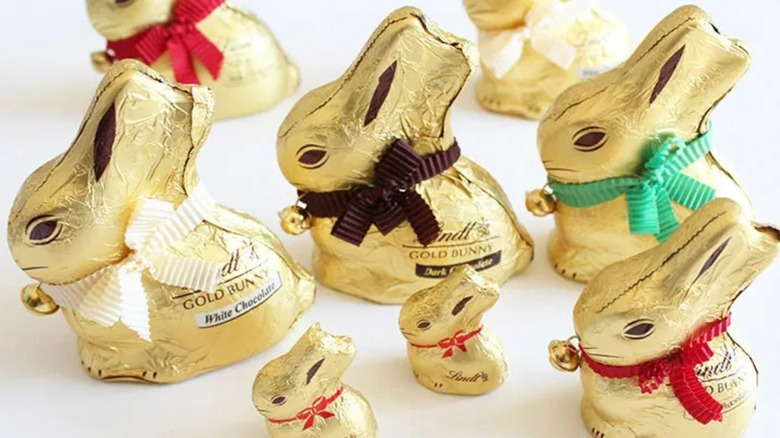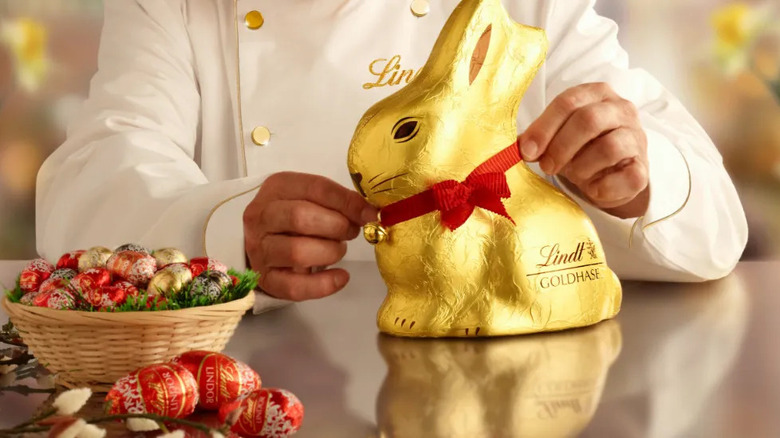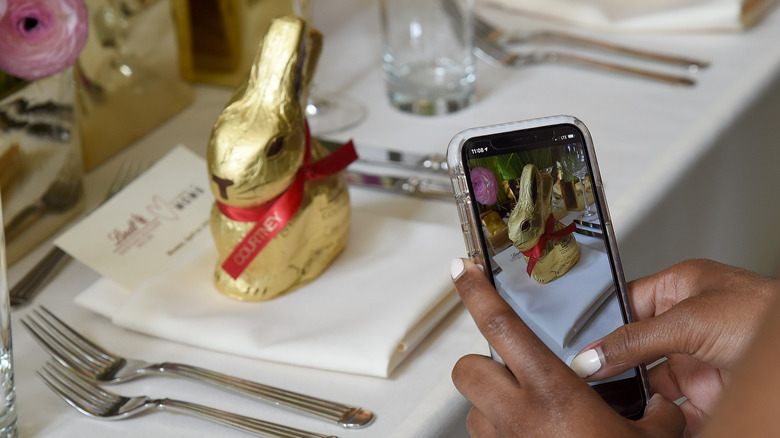Why A Court Told Lidl To Destroy Chocolate Bunnies
It's the end of the line for a small population of chocolate Easter bunnies manufactured by German grocer, Lidl, whose name you may recognize because Lidl has had a small presence in the U.S. since 2017 (via Winsight Grocery Business). On September 29, 2022, Switzerland's highest court determined Lidl's Favorina bunny, which comes wrapped in gold foil and sports a green bow around its neck, is likely to cause confusion among consumers hoping to get their hands on Lindt and Sprüngli's iconic gold foil wrapped chocolate bunny (via The Guardian), which Lindt began making and selling these in 1952. As such, the court held that Lidl's bunnies constitute an infringement of Lindt's intellectual property rights in Switzerland, according to The New York Times.
The upshot is that Lidl is now prohibited from selling Favorina bunnies throughout Switzerland. Further, Lidl has been ordered by the court to melt down all remaining bunnies that make up its Swiss inventory – so as to circumvent any future confusion. Fortunately, no chocolate bunnies will actually be harmed as a result of this ruling; Lidl says it has no Favorina bunnies earmarked for Swiss sale at this time. And Switzerland is the only jurisdiction where the Swiss court's ruling applies (via The New York Times).
In all fairness, things could have gone worse for Lidl – since the court had also been considering imposing monetary damages on Lidl. Nonetheless, Lindt's longtime domination within the global gold foil-wrapped bunny space remains far from certain.
Lindt's chocolate bunny legal victory is bittersweet
On Thursday, September 28, 2022, the highest court of Switzerland ordered the German grocer, Lidl, to destroy any Favorina chocolate foil-wrapped Easter bunnies that it may have already produced for Swiss sale, per The New York Times. But it's worth noting that things could actually have gone even better for Lindt if, say, the court had also ordered Lidl to pay Lindt money damages representing profits it made by infringing the iconic Lindt bunny, if not punitive damages, which are routinely awarded in U.S. intellectual property cases (per the law firm of Faegre Drinker, and are part of the IP rubric in the European Union (per World Preview).
But there is no evidence that Lindt was awarded money damages of any kind in this case. Further, to the extent that Lindt might have derived any sort of satisfaction from the mass melting of Lidl's Favorina inventory in Switzerland, there will only be a disappointment, as Lidl has stated that it has none in its inventory.
Nonetheless, Lindt's legal victory is significant. First, it reverses a 2021 Swiss trial court's decision to allow Lidl to continue to sell its Favorina bunnies in the Swiss market. Second, it represents a victory in Lindt's decades-long campaign to establish and defend its proprietary rights in its iconic gold-foil-wrapped Easter bunny design, according to Reuters. And things have not always gone so smoothly in that regard.
Lindt has been trying to dominate the gold foil wrapped bunny space for decades now
Lindt has a long history with its chocolate bunnies, going back to 1952, per Lindt & Sprüngli. Now they're a veritable cash cow, with an estimated 160 million "hopping around the world per year." Not surprisingly, Lindt has long been of the opinion that its bunnies constitute a valuable intellectual property asset (via Reuters). However, it has not always been successful in making that case for itself.
In the early aughts, Lindt successfully lobbied for copyright and trademark protection for said design. At various times since then, Lindt wielded that protection to stop the occasional rogue chocolate manufacturer from selling gold foil-wrapped chocolate Easter bunnies, including in 2011, when Lindt convinced an Austrian court to stop chocolatier Hauswirth to stop making its similarly designed bunnies, per BBC News. The next year, however, the European Court of Justice decided that Lindt really shouldn't have the right to enforce its bunny trademark throughout the European Union (also per BBC News). Nevertheless, in 2021, the brand got a German federal court to acknowledge the validity of the Lindt bunny's trademark protection against chocolatier Heilemann, which was also selling a gold foil-wrapped bunny (via Reuters). That same year, however, Lindt lost at the trial level to Lidl.
Lindt's recent victory on appeal is huge – but not necessarily anywhere but Switzerland, where the validity of Lindt's trademark is not in dispute, per The New York Times.


